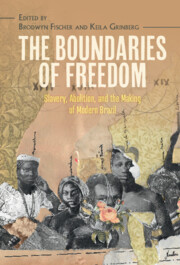Book contents
- The Boundaries of Freedom
- Afro-Latin America
- The Boundaries of Freedom
- Copyright page
- Contents
- Figures
- Tables
- Acknowledgments
- Introduction Slavery and Freedom in Nineteenth-Century Brazil
- Part I Law, Precarity, and Affective Economies during Brazil’s Slave Empire
- Part II Bounded Emancipations
- 6 Body, Gender, and Identity on the Threshold of Abolition
- 7 Slavery, Freedom, and the Relational City in Abolition-Era Recife
- 8 Migrações ao sul
- Part III Racial Silence and Black Intellectual Subjectivities
- Part IV Afterlives of Slavery, Afterwards of Abolition
- Bibliography
- Index
6 - Body, Gender, and Identity on the Threshold of Abolition
A Tale Doubly Told by Benedicta Maria da Ilha, a Free Woman, and Ovídia, a Slave
from Part II - Bounded Emancipations
- The Boundaries of Freedom
- Afro-Latin America
- The Boundaries of Freedom
- Copyright page
- Contents
- Figures
- Tables
- Acknowledgments
- Introduction Slavery and Freedom in Nineteenth-Century Brazil
- Part I Law, Precarity, and Affective Economies during Brazil’s Slave Empire
- Part II Bounded Emancipations
- 6 Body, Gender, and Identity on the Threshold of Abolition
- 7 Slavery, Freedom, and the Relational City in Abolition-Era Recife
- 8 Migrações ao sul
- Part III Racial Silence and Black Intellectual Subjectivities
- Part IV Afterlives of Slavery, Afterwards of Abolition
- Bibliography
- Index
Summary
This chapter traces the parallel life stories spun by a single woman – “Benedicta” to some and “Ovídia” to others – in pursuit of freedom in 1880s Brazil. Building upon a vast historiography, it uses a single microhistory to recuperate the social practices, ways of life, and world visions that resided below the surface of judicial testimony. In so doing, it opens an important window through which we can apprehend the ways in which women on the borders of slavery and freedom constructed their identity during Brazil’s age of abolition.
- Type
- Chapter
- Information
- The Boundaries of FreedomSlavery, Abolition, and the Making of Modern Brazil, pp. 163 - 182Publisher: Cambridge University PressPrint publication year: 2022

